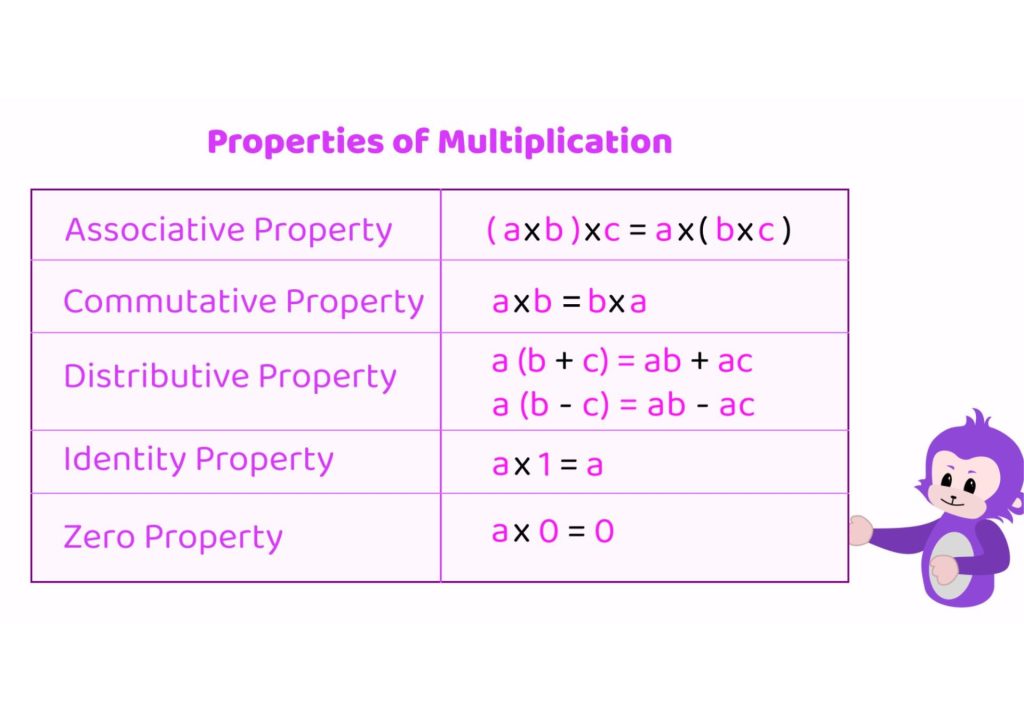Properties of Multiplication – Definition with Example
Table of Contents
Introduction
Properties of Multiplication
In the realm of mathematics, the properties of multiplication play a crucial role in understanding the behavior of numbers and operations. From the associative and commutative properties to the distributive property and identity property, each concept holds significance in simplifying mathematical operations and solving equations. Let’s delve into the world of multiplication properties and unravel their importance in mathematical contexts.
Analogy of Definition
What are Properties of Multiplication?
The properties of multiplication encompass various rules and principles that govern the operation of multiplying numbers. These properties include the associative property, distributive property, commutative property, identity property, and zero property. Each property offers unique insights into the behavior of numbers when subjected to multiplication.
Method
Associative Property
The associative property states that the way in which numbers are grouped in a multiplication expression does not affect the result. For example, (2 x 3) x 4 = 2 x (3 x 4) = 24. It can be expressed as a x (b x c) =(a x b) x c
Commutative Property
The commutative property states that the order of the numbers in a multiplication expression does not affect the result. For example, 2 x 3 = 3 x 2 = 6. The property can be expressed as a x b = b x a= c
Distributive Property
The distributive property states that multiplication distributes over addition and subtraction. For example, 2 x (3 + 4) = (2 x 3) + (2 x 4) = 14. The property can be expresses as a x (b + c) = (a x b) + (a x c)
Identity Property
The identity property states that any number multiplied by 1 is the number itself. For example, 5 x 1 = 5. It can be expressed as a x 1 = a.
Zero Property
The zero property states that any number multiplied by 0 is 0. For example, 8 x 0 = 0. It can be expresses as a x 0 = 0

Examples
Example 1: Distributive Property
Verify Distributive Property by solving 2 x (3 + 4)
As per distributive property = (2 x 3) + (2 x 4) = 6 + 8 = 14
Quiz
Tips and Tricks
1. Applying the associative property of multiplication.
Tip: Remember that the associative property allows you to change the grouping of numbers in a multiplication expression without changing the result.
2. Testing the commutative property of multiplication.
Tip: Verify that the order of the numbers in a multiplication expression does not affect the result, as per the commutative property.
3. Using the distributive property of multiplication.
Tip: Apply the distributive property to simplify expressions by distributing the multiplication over addition or subtraction.
4.Applying the identity property of multiplication.
Tip: Remember that any number multiplied by 1 is the number itself, as per the identity property of multiplication.
5. Testing the zero property of multiplication.
Tip: Keep in mind that any number multiplied by 0 results in 0, as per the zero property of multiplication.
Real life application
Story: “The Multiplication Adventure of Mia and Ethan”
Mia and Ethan, two young mathematicians, embarked on an adventure that led them to discover the real-life applications of multiplication properties in various scenarios.
Scenario 1: The Baking Bonanza
Mia and Ethan decided to bake cookies for a charity event. They encountered a recipe that required them to double the ingredients. Applying the commutative property of multiplication, they realized that the order in which they multiplied the ingredients did not affect the final outcome, making the baking process more efficient.
Scenario 2: The Garden Project
In their neighborhood, Mia and Ethan volunteered to help plant flowers in a community garden. They utilized the distributive property of multiplication to calculate the total number of flowers needed when planting rows of flowers, streamlining the process and ensuring an even distribution of resources.
Scenario 3: The School Fundraiser
As part of a school fundraiser, Mia and Ethan were tasked with organizing gift bags for the attendees. They applied the zero property of multiplication to determine the quantity of items needed for the gift bags, ensuring that no items were wasted in the process.
FAQ's
Like? Share it with your friends
